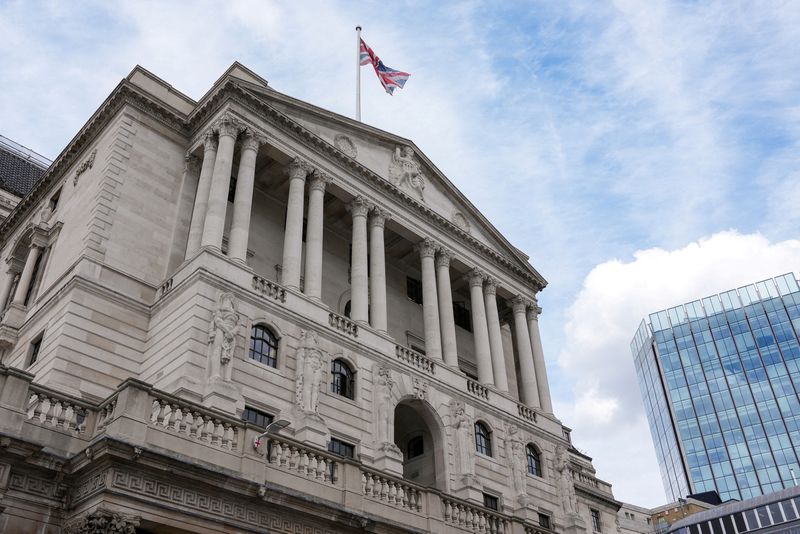By Shaloo Shrivastava
BENGALURU (Reuters) -The Bank of England (BoE) will hike its main interest rate by 25 basis points on Sept. 21 to its highest in more than 15 years, a Reuters poll of economists showed, with a significant minority saying there was still room for further tightening this year.
Despite easing to 6.8% in July from 11.1% last October, Britain's inflation rate - the highest among major economies - was forecast to stay above the BoE's 2% target for years, suggesting the central bank has more ground to cover.
While 515 basis points of hikes since December 2021 have tamed price rises somewhat, all but two of 23 economists who answered an additional question said risks to their inflation forecasts were skewed higher.
Nearly all 65 economists in the Sept. 11-13 Reuters poll expected the BoE to hike its Bank Rate by 25 basis points to 5.50% this month, in line with interest rate futures pricing. Only one expected no move.
"Services price inflation hasn't really shifted yet and we think the Bank of England will want compelling evidence that this is on its way down," said Ellie Henderson at Investec.
"We think the Bank of England will want to keep tightening the screws for just a little longer."
Survey medians showed the Bank Rate was expected to peak at 5.50%, matching rate futures pricing, and stay there until mid-2024. However, almost half, 30 of 65 respondents, predicted a peak of 5.75% or higher next quarter.
While 28 economists expected the Bank Rate to peak at 5.75%, two said 6.00%.
"If the BoE wants to signal that this is the last hike, it might be tempted to change its guidance to something more neutral," noted economists at HSBC (LON:HSBA).
"But we would say there remains some uncertainty: the MPC (BoE's Monetary Policy Committee) will only see one more labour market and inflation release between next week's meeting and the following one, on 2 November."
Nine of 16 gilt-edged Market Makers (GEMMs) that participated in the poll predicted a 5.50% peak rate and seven said 5.75%.
Policymakers also appear divided on how much higher rates need to go.
BoE Governor Andrew Bailey said last week the central bank was "much nearer" to ending its rate rising cycle while hinting at a September hike. Catherine Mann, a known hawk, said on Monday it was better the central bank erred on the side of raising rates too high rather than stopping prematurely.
Inflation was forecast to average 6.8% and 4.7% this quarter and next, respectively, and stay above the BoE's 2% target at least until 2025. Britain's economy was expected to grow 0.4% and 0.5% this year and next.
While the economy contracted more than expected in July, an 8.5% annual rise in average weekly earnings in the three months to July may keep demand firm and by extension price pressures elevated.
With mortgage rates recently reaching a 15-year high, property prices, a main source of household wealth in Britain, have declined. Values showed the most widespread falls in 14 years in August, the Royal Institution of Chartered Surveyors said on Thursday.

A separate Reuters poll showed average house prices in Britain were predicted to fall 4% this year and flatline in 2024 before rising in 2025.
(For other stories from the Reuters global economic poll:)